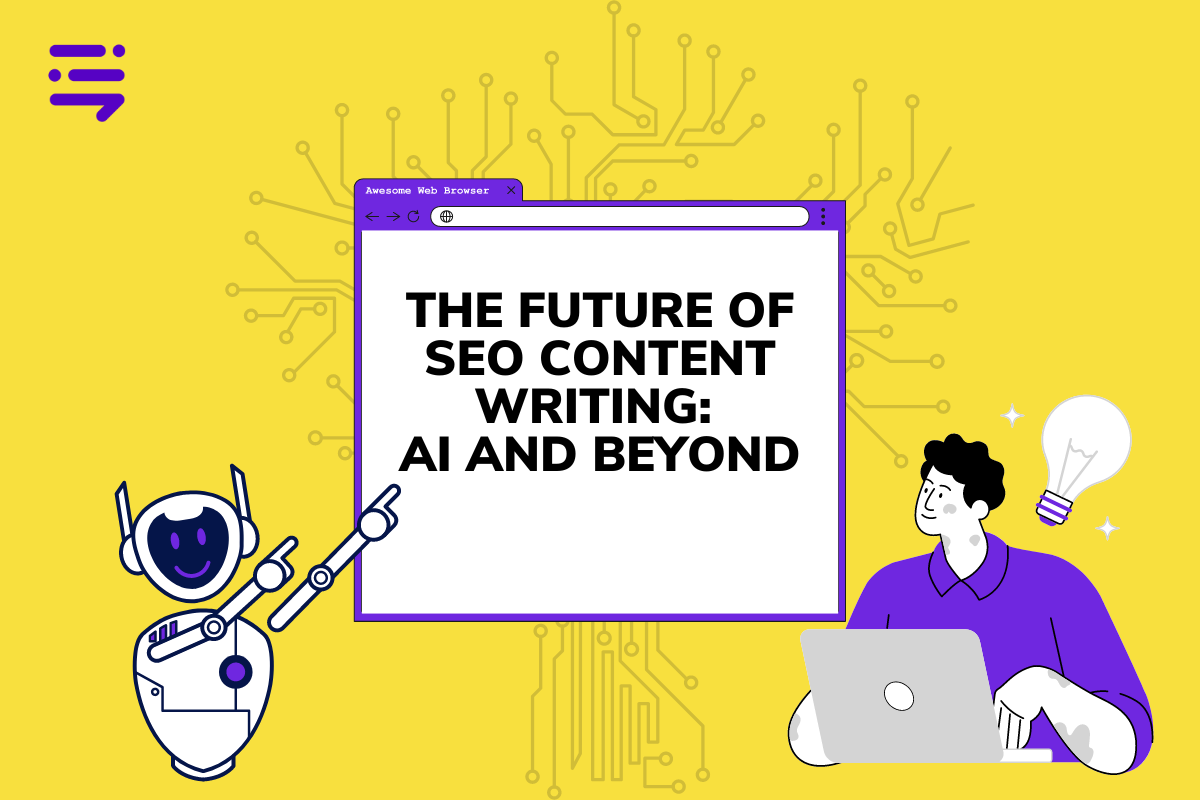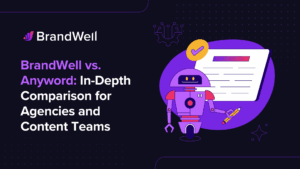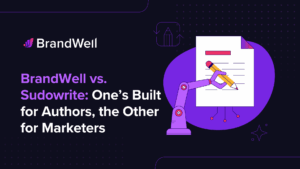The global SEO industry grew to $68 billion in 2022 and is expected to reach $129.6 billion by 2030.
SEO content writing, in particular, is undergoing a rapid transformation — thanks to the explosion of ChatGPT and other AI-powered software solutions.
As AI advances, the distinction between human-written content and machine-generated text is becoming increasingly blurred.
What does this mean for SEO content writers and the future of SEO content writing?
This blog post will look into the impact of AI on search, compare human writers with their machine counterparts, explore multimedia and interactive content strategies, and discuss how digital marketing professionals can adapt to change while maintaining their creative edge as we all navigate the future of SEO content writing.
Table of Contents:
- AI-Powered Content Writing: The Game Changer in SEO
- How AI Content is Transforming Industries
- Human Writers vs. AI: The Battle for Quality and Connection
- What Generative AI Means for Content Writing
- Why Relying 100% on AI is a Bad Idea
- How to Correctly and Responsibly Use AI in Content Creation
- What The Future Holds for Marketing Agencies
- FAQs – The Future of SEO Content Writing
- Conclusion
AI-Powered Content Writing: The Game Changer in SEO
Hold on to your hats, folks.
The future of SEO content writing is taking a massive leap forward with advancements in artificial intelligence (AI) and natural language processing (NLP).
Gone are the days when human writers solely dominated the world of content creation.
For example, Heliograf and Wordsmith have already created thousands of articles for news organizations like the Washington Post and the Associated Press, significantly increasing their published content volume.
Even further, ChatGPT and BrandWell are helping businesses and marketers scale up their content production without sacrificing quality. This increase leads to more competition on search engine results pages (SERPs), making it crucial for you to up your game.
What does this mean for your existing SEO strategies?
- A surge in AI-generated content will lead to an even more competitive landscape within search engines.
- To stand out from similar or copycat content, creating helpful information that provides value becomes increasingly important.
- Focusing on keyword research, meta tags, and content performance optimization will be essential to stay ahead of the curve.
How AI Content is Transforming Industries
AI content is transforming many industries. From e-commerce to news outlets, businesses across various sectors are now using AI-powered writing tools to improve efficiency and effectiveness in content creation.
E-commerce
With the rise of online shopping, retailers have a growing need for high-quality product descriptions that can drive sales. However, creating unique descriptions for thousands or even millions of products can be a daunting task for human writers. This is where AI-powered writing tools come into play.
By using natural language processing algorithms and machine learning models, these tools can automatically generate compelling product descriptions at scale. For instance, an e-commerce giant like Amazon uses AI-generated copy to populate its vast catalog with engaging product information that helps customers make informed purchase decisions.
In addition to generating product descriptions, AI-powered tools can also help personalize the customer experience by analyzing data on individual preferences and behavior patterns. By tailoring their messaging based on this data, retailers can increase engagement rates and ultimately boost conversions.
News Outlets
Covering breaking news stories as they happen has always been challenging for journalists who must scramble to get accurate information out quickly without sacrificing accuracy. In recent years, many news outlets have turned towards automated journalism powered by artificial intelligence which allows them not only to cover more stories but also to do so more efficiently.
One prime example is the Washington Post’s Heliograf tool which was used during the 2016 Rio Olympics games to publish hundreds of articles covering scores and results from every event — freeing up reporters’ time while providing quick turnaround times between coverage.
Finance
The financial industry has always been data-driven, with a need for accurate and timely analysis of market trends and investment opportunities. AI-powered writing tools are being used to generate reports and analyses on these trends at scale.
For example, JPMorgan Chase uses an AI-powered tool called COIN which analyzes legal documents in seconds compared to the hours it would take human lawyers — freeing up valuable time while also improving accuracy.
By automating complex tasks, business owners can gain valuable insights into their audience’s preferences, thereby creating helpful content that resonates with readers and search engines.
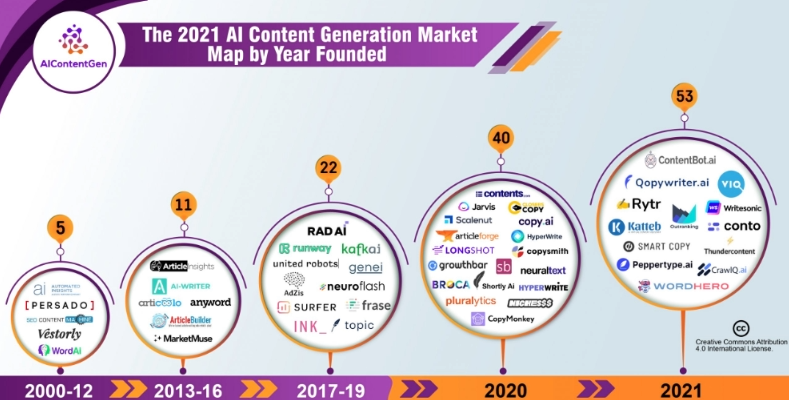
AI content generators’ growth map before ChatGPT
Human Writers vs. AI: The Battle for Quality and Connection
Although AI-generated content has improved significantly, it still falls short of what humans can produce when creating meaningful connections.
As a modern-day SEO content creator, I’ve seen the evolution of content writing firsthand. While AI-generated content has its benefits, it still lacks the human touch that makes content truly connect with readers.
Creating content that resonates with your intended audience is increasingly important as search engines and social media platforms constantly update their algorithms to prioritize helpful and engaging content.
While AI-generated content can help with complex tasks like keyword research and identifying trends, it can’t replace the creativity and empathy that human writers bring to the table.
Duplicate content is also a real issue in the world of SEO, and AI-generated content can sometimes fall into this trap. Human writers, on the other hand, can use their unique perspectives and experiences to create original and valuable content that stands out from the crowd.
When it comes to content performance, human writers have the advantage of being able to optimize content based on their own experiences and gain valuable insights from their audience. AI-generated content, while efficient, can sometimes miss the mark in terms of tone and style.
Of course, this isn’t to say that AI-generated content doesn’t have its place. AI can be a useful tool for generating content at scale and for content distribution. But when it comes to creating content that truly connects with readers, human writers are still the gold standard.
So, while AI-generated content may be on the rise, it’s unlikely that it will ever fully replace human writers. Instead, man and machine will continue to work together to create the best possible content for readers and search engines alike.
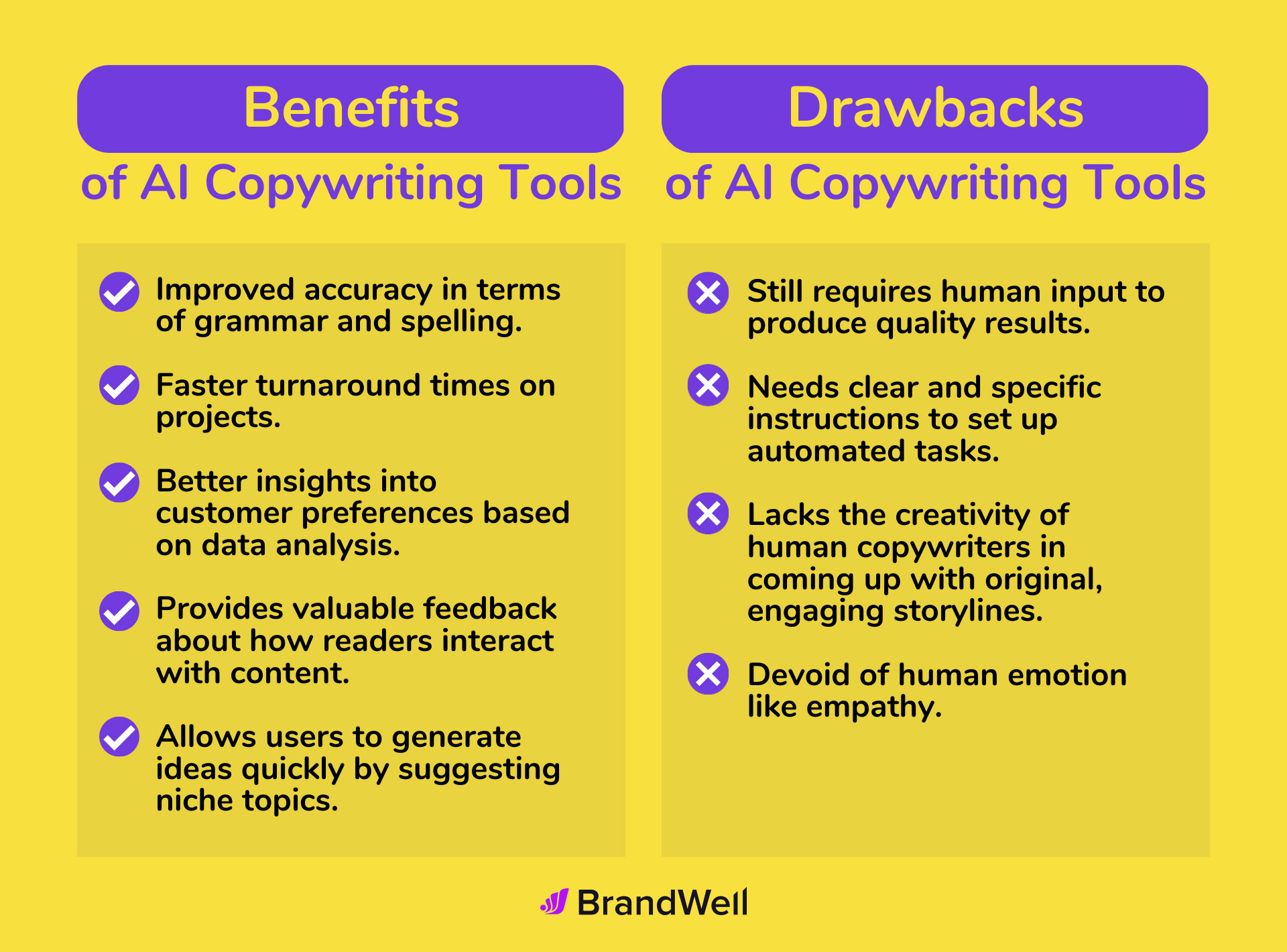
What Generative AI Means for Content Writing
The latest AI language model to hit the scene is GPT-4, which stands for Generative Pre-trained Transformer 4. This technology has sparked discussions about its potential impact on content creation and what it means for human writers.
- Increased productivity: By using AI-generated templates or suggestions, SEO professionals can focus on more complex tasks like keyword research or identifying trends. AI can also help content creators produce more content in less time, especially short-form content like emails and social media posts.
- Improved quality: Since GPT-4 is trained on a massive dataset of text and code, this allows it to generate text that is more accurate, relevant, and engaging as compared to earlier models.
- Reduced costs: GPT-4 can be used to automate many of the tasks that are traditionally done by human content creators, which could save you money by eliminating lower-level administrative work or general content writing.
- Improved reach: GPT-4 can generate content in different languages and formats, which makes it more accessible to a global audience.
GPT’s ability to process vast amounts of data also makes it useful when creating volumes of content quickly. For instance, if you need to write a hundred unique product descriptions today, you don’t have to make your writers work overtime to meet your deadline.
Why Relying 100% on AI is a Bad Idea
While AI can generate large volumes of content quickly and efficiently, relying solely on technology to produce your website’s entire copy is not advisable.
Here are four reasons why.
1. Inaccuracy and Poor Quality
The accuracy of generated content cannot always be guaranteed. The algorithms used by AI are only as good as the data they receive, hence if there are errors or misinformation in the input data, then these mistakes will reflect in the output.
Additionally, readability may suffer if an automated system lacks human oversight — resulting in poor-quality writing.
2. Lack of Relevance
While generating vast amounts of text might seem like a great idea initially, you must consider whether all that text serves its intended purpose effectively. With no understanding of context or audience analysis, your AI tool will simply produce generic articles with little relevance to your audience’s needs.
3. No Creativity or Personality
A computer program does not have emotions or creativity. This makes it difficult for AI content to connect with readers. AI-written text is often flat, boring, and lacks personality compared to human-written works where writers inject their unique experiences and perspectives that make the material much more enjoyable to read.
4. Cultural Insensitivity
AI also lacks cultural sensitivity, which could lead to bots writing inappropriate or offensive material. This could result in negative consequences for your brand such as public backlash that could damage your reputation.
How to Correctly and Responsibly Use AI in Content Creation
While AI-generated content can be a valuable tool for creating large amounts of copy quickly, it should not replace human skills entirely. Instead, use the technology as a writing assistant and combine it with human expertise to create helpful content optimized for search engines.
How do you get man (or woman) and machine to work together seamlessly?
Do Your Keyword Research
First of all, AI will not write by itself. You have to feed it with information like a prompt, keyword, or URL.
To use AI effectively in your content creation process, you need to understand the intent behind the keywords you’re targeting. This means conducting thorough keyword research before creating any new pieces of content. You can use SEO tools like Ahrefs or SEMrush to help with this task.
Once you’ve identified your target keywords, take some time to analyze search results for those terms manually. This will give you a better understanding of what type of content is already out there and what gaps exist that your own piece could fill.
Create Specific Briefs and Outlines
Depending on the AI tool you are using, you might need to create briefs and outlines manually.
Break down your topic into smaller subtopics and then use ChatGPT to fill each section. You should ask very specific questions if you want good answers — “garbage in, garbage out” applies here.
Instead of just saying “Write me a 1,000-word article about dog training,” break down your topic into specific questions and provide detailed instructions on tone and style.
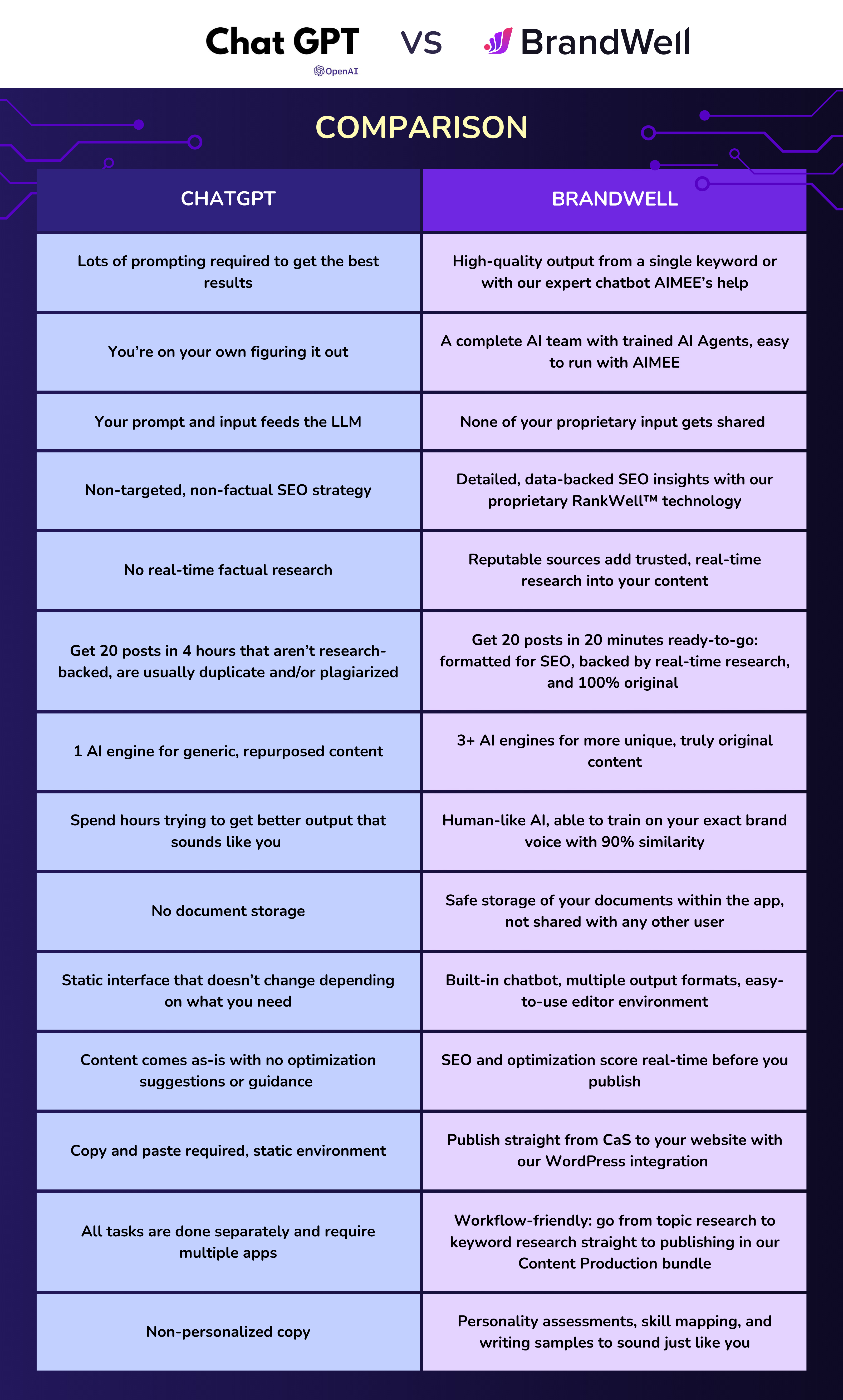
If you’re using a specialized tool like BrandWell, then you can skip these manual parts. The app will take care of everything for you — from research to creating blog outlines, to writing the first draft.
Just enter the long-tail keyword you want to rank for and BrandWell will generate a long-form blog post (that means 2,000, 3,000, or even up to 7,000 words) based on the top-ranking content in your niche.
You don’t even have to format your content as every BrandWell output comes in a publish-ready structure, complete with headers, bullet points, table of contents, custom CTAs, and meta tags.
Verify the Information and Follow Google Guidelines
After the AI writes your article, it’s time to polish it off with your editing skills.
Bear in mind that AI-generated content is not always 100% accurate. As such, it’s essential to verify any information generated by an algorithmic tool before publishing it on your website or blog.
Also, you want to make sure that your content follows Google guidelines so that it doesn’t get flagged.
Google doesn’t care whether your content is written by humans or AI — if it’s written to manipulate SERP rankings and does not provide any value to the user at all, Google is going to punish that content.
What The Future Holds for Marketing Agencies
The future of SEO content writing is here, but before you go all-in on automation, here are a few things you must consider while embracing these technological advancements.
Build Skilled Teams for the Future
Don’t just rely on AI — invest in your team. Hire skilled writers who can turn AI-generated content into high-quality pieces that engage readers emotionally by adding that personal touch that machines simply cannot replicate.
Embrace Experimentation
Be open to change and innovation. Diversify your strategies by combining traditional methods like keyword research, with cutting-edge technologies such as natural language processing or generative AI tools.
Stick to Quality Over Quantity
Even if your AI tool can generate a hundred posts per week, stick to your good old mantra of quality over quantity. Scaling content should not be done at the expense of quality control measures.
Implement a quality assurance process to guarantee the content you produce is up to standard, no matter if it’s created by humans or AI.
Take Advantage of Data-Driven Insights
Here’s the kicker: AI-generated content can help you gain valuable insights, identify trends, and optimize existing content for better performance in search results. This means you can use AI as a powerful tool alongside human writers to create helpful and engaging content that resonates with your intended audience.
The key is to find a harmony between technology and human input to stay competitive in this ever-changing landscape.
FAQs – The Future of SEO Content Writing
Can a content writer become an SEO?
Yes, a content writer can become an SEO expert by learning essential skills such as keyword research, on-page optimization, and link building. They should also stay updated with the latest trends in search engine algorithms and industry best practices. Check out our blog for some great SEO and AI resources.
What is the future of content writing?
The future of content writing will involve more AI-generated content, multimedia strategies, interactive elements, and social media copywriting. Human writers will still play a crucial role in creating emotionally engaging stories while leveraging automation tools for optimization.
How much do SEO content writers make?
SEO content writers’ salaries vary based on factors like experience level, location, and company size. According to PayScale, the average salary for an entry-level content writer in the United States is around $42,000 per year. However, experienced professionals specializing in SEO can earn significantly higher compensation.
How does SEO help in content writing?
SEO helps improve online visibility by optimizing written material according to search engine guidelines. This includes:
- Incorporating relevant keywords naturally within the text
- Using proper heading structure (H1-H6)
- Adding meta tags, title tags, and alt text for images
- Creating engaging content that attracts backlinks
- Designing a mobile-friendly website
Conclusion
Far from it. In fact, the future of SEO content writing is looking more exciting than ever. With advancements in technology and evolving search engine algorithms, there are ample opportunities for creative and strategic content creators to thrive in the digital landscape.
As search engines become smarter and more focused on delivering valuable, relevant, and user-friendly content, the emphasis on high-quality writing is paramount. It’s no longer just about stuffing keywords into an article — it’s about crafting engaging, informative, and optimized content that connects with the target audience.
The future of SEO content writing will continue to prioritize user intent and user experience. Content creators will need to understand their audience’s needs and tailor their writing accordingly. This means creating content that answers questions, solves problems, and provides genuine value.
Moreover, multimedia elements such as videos, infographics, and interactive content will significantly enhance the overall user experience and boost search rankings. As technology advances, content creators will have more tools and platforms at their disposal to create engaging and shareable content.
Additionally, as voice search and artificial intelligence continue to gain prominence, SEO content writers will need to adapt their strategies to cater to these emerging trends. Understanding how people search using voice commands and optimizing content for voice assistants will become essential skills for success.
While the future of SEO content writing may bring new challenges, it also presents exciting opportunities for those willing to adapt and innovate. By staying informed about the latest SEO trends, embracing technology, and focusing on providing value to users, content writers can continue to excel in the ever-evolving digital landscape.

